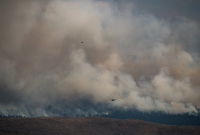Support strong Canadian climate journalism for 2025
The fires of public opinion might be smouldering like the zombie fires seething underground, according to some tantalizing new research.
It takes a real act of will to recall that time, not so very long ago, when politicians were rushing to the front of the parade, eager to align with the millions of climate marchers converging on city centres around the world. The pandemic sucked oxygen from those flames and the subsequent economic distress has kept them tamped. But the desire for action may just be overwintering.
There seems to be a truly surprising level of desire for action on climate, just below the surface and in all corners of the world. It is largely dormant because most of us think we’re alone in our anxiety — we are “conditional co-operators” waiting for ignition, according to the people who track this kind of thing. Tragically, the actual fires of climate change are not so hesitant.
We’ll look at the metaphorical fires of public sentiment as well as the zombie fires smoking underground in this week’s newsletter. We’d better begin with the ones closest to eruption.
The Alberta government has already declared the official start of fire season. There are more than 50 fires in the province, most of them zombie fires that refused to extinguish after the infernos of 2023.
The provincial government cannot bring itself to utter the words “climate change” but is clearly spooked by the briefings it’s getting from officials — large swaths of Alberta are tinder-dry, suffering severe or extreme drought.
And wildfire smoke is already a problem for residents of Fort Nelson, B.C. That province has 92 fires simmering away. That’s a lot in contrast to any previous winter. Zombie fires used to be a freakish curiosity. More recently, 15 would have been average. This year is “mind-boggling … just unheard of,” says one forest scientist.
The fire map for Western Canada is shocking — the orange dots are the hibernating zombies, only the fires coded in red are considered “out of control.” But I’m sure many of you will have the same reaction I did: “It’s only freaking February!”

Most zombie fires smoulder unnoticed over winter. But around Fort Nelson, there have been clouds of smoke rising from the ground within 40 kilometres of town. Even the snowstorms have been sinister — not so much whiteouts as blue-grey blizzards.
"I'd never experienced a snowstorm that smelled like smoke," Sonja Leverkus, a firefighter and scientist, told the BBC.
Our tactical maps show the zombies are concentrated in Western Canada, but this weird winter has other Canadians anxious as well. Noah Freedman, a forest fire crew leader and vice-president of Ontario Public Service Employees Union Local 703, sounded the alarm this week. Writing in Canada’s National Observer, Freedman says the provincial government is on a campaign to silence firefighters’ warnings.
“As Ontario’s vast forests become more volatile, its wildfire program grows increasingly fragile due to a series of crises the government has been ignoring for years,” says Freedman.
We can’t know what any specific year will bring. But the indicators are ominous. Snowpack is low, drought is widespread and Environment and Climate Change Canada projects abnormally high temperatures across the country this spring and summer.
I’ve plugged John Vaillant’s extraordinary book Fire Weather before. It couldn’t have been more timely when it was published in May last year and seems equally so in February 2024. If you haven’t read it yet, there might still be time before the zombies emerge on the landscape. As Vaillant writes, “There is in our future a potentially winter-less scenario in which fire weather is the only weather, and ‘fire season’ never ends."
Smouldering desire
Let’s turn to the kind of flareup that would be welcome: What if I told you that 89 per cent of people around the world think their government should do more to fight global warming? And over two-thirds say they would be willing to contribute one per cent of their income to the task?
Skeptical? I certainly was. But there are powerful insights in the global survey that found those results — we are profoundly social creatures and our public expressions are shaped by norms and our perceptions of those around us. Those perceptions are way off the mark, the study found. People all over the world seriously underestimate the commitment others are willing to make.
And the researchers hone in on a second insight: We might be well-meaning but we’re not prepared to be chumps. That’s not their language. In the research team’s more fancy terminology, humans are “conditional co-operators.” We’ll follow through if we think others will too. But, for the moment, most of us “systematically underestimate the willingness of fellow citizens to act.”
The research was published this month in Nature Climate Change based on polling by Gallup, which surveyed nearly 130,000 people across 125 countries. When it comes to acting against climate pollution, “the world is in a state of pluralistic ignorance,” conclude the authors. “People systematically misperceive the beliefs or attitudes held by others.”
In 114 out of 125 countries, a majority is willing to contribute. But in 110 of them, that majority mistakenly thinks they are a minority.
So, if the results don’t track with your own daily experience around town, it could be that there’s more desire for action smouldering under the surface than people feel willing to express.
It could also be that you live in a country like Canada. One of the wrenching results of the research is that people are more willing to step up in countries that are poorer (and less-dominated by fossil fuel promotion).
The lighter the colour on the map below, the more tight-fisted. You can’t help but notice the correlation with places where fossil fuel propagandists have been given the largest share of voice.
Figure 1: Widespread global support for climate action. From Andre, P et al. Nat. Clim. Chang. (2024)
Whatever the colour and no matter where a country ranks on the list, there is still a strong latent desire for more climate action. Its public expression may be mangled by propaganda and political distortions. But, smouldering beneath the surface, the researchers found that 82 per cent of Canadians want intensified political action.
After sifting through all those responses and dissecting the obstacles, the team arrived at a simple but fundamental conclusion:
“Rather than echoing the concerns of a vocal minority that opposes any form of climate action, we need to effectively communicate that the vast majority of people around the world are willing to act and expect their national government to act.”
Chris Hatch writes Canada's National Observer's celebrated Sunday newsletter, Zero Carbon (please subscribe). Chris is the former executive director of Rainforest Action Network as well as the former executive editor at Canada's National Observer.






Comments